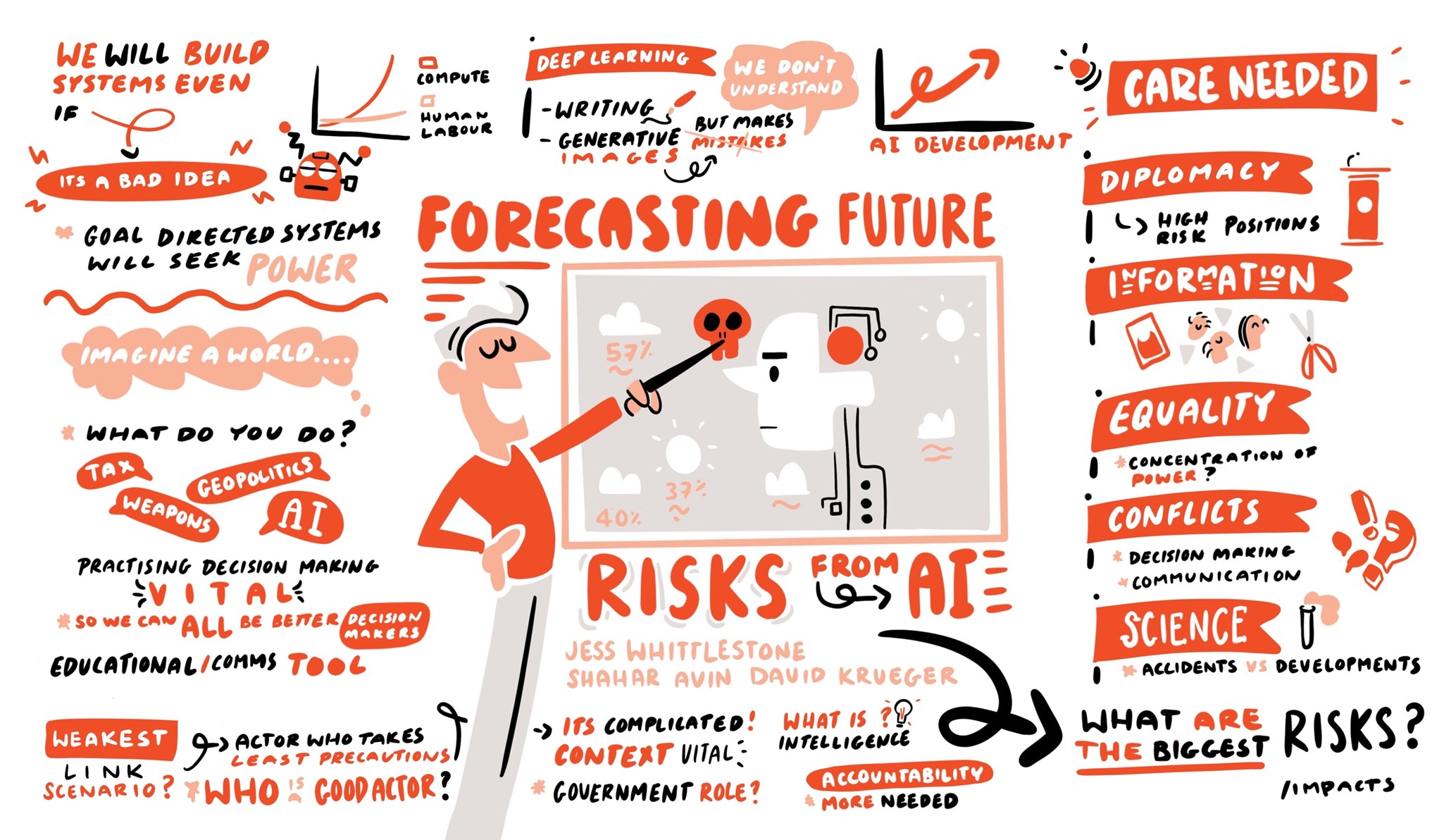Cambridge Conference on Catastrophic Risk 2022
Day 1 - Focused on how to study unprecedented and extreme future risks.
The day opened with addresses by CSER’s co-founder, Martin Rees, providing personal reflections on existential risk and the work of the centre, and CSER’s Deputy Director, Jess Bland, who talked about “Strange Aids to Thought: Why Do Imagined Worlds Help Build Resilience to Very Real Catastrophic Risks?”
After a short ice breaker exercise from Pablo Suarez of the Red Cross to introduce participants both in the room and on-line, the day continued with a presentation on CSER’s approach to foresight and horizon scanning by Luke Kemp. Luke presented different foresight and forecasting methods for global catastrophe: their strengths, limitations, and how they can be combined to create a more accurate and robust foresight system.

Throughout the conference, artist Tom McLean created live-drawings based on the talks and panels.
The next session focused on different perspectives on how to study future risks from Artificial Intelligence, with a particular focus on techniques that fully account for the diversity of contexts surrounding its development. This was opened with a keynote address by Tina Park from the Partnership for AI on Addressing the Challenges of Inclusive Practises in AI Development.

The discussion was then continued by a panel of Jess Whittlestone, from the Centre for Long Term Resilience, who talked about the analytical exploration of future risks, Shahar Avin, from CSER, who talked about exploring extreme risks through role-play, and David Krueger, from the Department for Engineering, who talked about “Deep Learning, Scaling, Alignment and Existential Risk”.

The afternoon opened with a series of on-line lightning talks on a wider variety of topics around existential and global catastrophic risk:
- Ross Tieman, “Digital Fragility - Digitization of Critical Infrastructure and Increased Risk of Catastrophic Failures”
- Caroline Baylon, “Tackling Interconnected Global Risks: The Need for Long-term Thinking and a Multilateral Approach”
- Nora Ammann, “Learning from Existing Complex System about Existential Risks and Alignment”
- Markus Reichstein, “Existential risk - Emerging from systemic and compound risk?”
- Eamon Aloyo, “The Catastrophic Risk Reduction Case for Funding Research on Stratospheric Aerosol Removal”
- Michael Cassidy, “Large magnitude volcanic eruptions as global catastrophic risks and existential risk factors”
- Anders Sandberg, “Volcano engineering ethics”
- Felix Riede, “Apocalypse then, Apocalypse now? Building realistic disaster scenarios for low-frequency/high-magnitude volcanism in Europe using the Laacher”
- Matthew Rendall, “Nuclear war as a predictable surprise”
- Juan Garcia, “Integrated assessment of food production in response to global catastrophic food risks”
- Alix Pham, “Balanced diets on resilient foods in abrupt sunlight reduction scenarios”
- Dennis M. Bushnell, “Halophytes For Land, Water, Food, Energy, Climate”
Finally, all participants came back together for a closing address by Joachim Isacsson titled “Tomorrow Never Dies: Bolts from the Blue and Creeping Crises, Disruptions in a Changing World”, which drew on his experiences working for the Development, Concepts, and Doctrine Centre at the UK Ministry of Defence.
